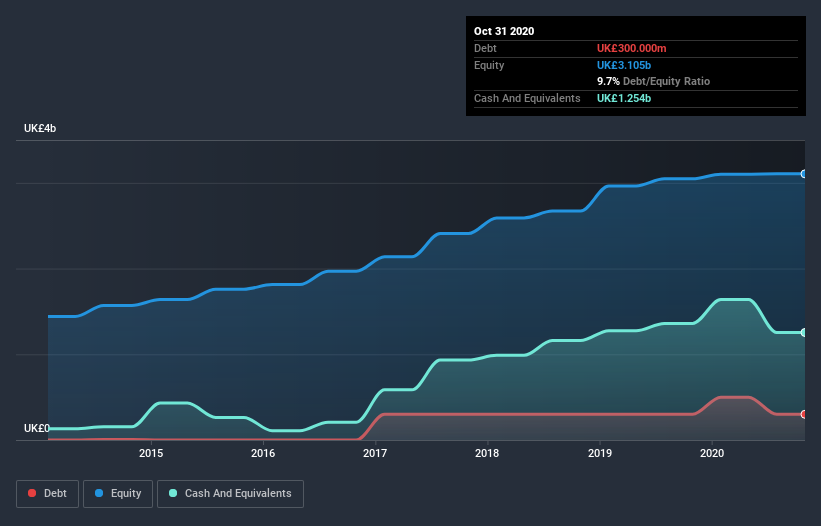Here's Why Berkeley Group Holdings (LON:BKG) Can Manage Its Debt Responsibly
Legendary fund manager Li Lu (who Charlie Munger backed) once said, 'The biggest investment risk is not the volatility of prices, but whether you will suffer a permanent loss of capital.' So it seems the smart money knows that debt - which is usually involved in bankruptcies - is a very important factor, when you assess how risky a company is. As with many other companies The Berkeley Group Holdings plc (LON:BKG) makes use of debt. But is this debt a concern to shareholders?
What Risk Does Debt Bring?
Debt assists a business until the business has trouble paying it off, either with new capital or with free cash flow. If things get really bad, the lenders can take control of the business. However, a more usual (but still expensive) situation is where a company must dilute shareholders at a cheap share price simply to get debt under control. Of course, debt can be an important tool in businesses, particularly capital heavy businesses. When we examine debt levels, we first consider both cash and debt levels, together.
See our latest analysis for Berkeley Group Holdings
What Is Berkeley Group Holdings's Debt?
The chart below, which you can click on for greater detail, shows that Berkeley Group Holdings had UK£300.0m in debt in October 2020; about the same as the year before. But it also has UK£1.25b in cash to offset that, meaning it has UK£954.3m net cash.
How Strong Is Berkeley Group Holdings's Balance Sheet?
Zooming in on the latest balance sheet data, we can see that Berkeley Group Holdings had liabilities of UK£1.80b due within 12 months and liabilities of UK£695.1m due beyond that. Offsetting these obligations, it had cash of UK£1.25b as well as receivables valued at UK£81.0m due within 12 months. So its liabilities total UK£1.16b more than the combination of its cash and short-term receivables.
Given Berkeley Group Holdings has a market capitalization of UK£5.95b, it's hard to believe these liabilities pose much threat. Having said that, it's clear that we should continue to monitor its balance sheet, lest it change for the worse. While it does have liabilities worth noting, Berkeley Group Holdings also has more cash than debt, so we're pretty confident it can manage its debt safely.
The modesty of its debt load may become crucial for Berkeley Group Holdings if management cannot prevent a repeat of the 29% cut to EBIT over the last year. When a company sees its earnings tank, it can sometimes find its relationships with its lenders turn sour. There's no doubt that we learn most about debt from the balance sheet. But it is future earnings, more than anything, that will determine Berkeley Group Holdings's ability to maintain a healthy balance sheet going forward. So if you want to see what the professionals think, you might find this free report on analyst profit forecasts to be interesting.
Finally, a business needs free cash flow to pay off debt; accounting profits just don't cut it. While Berkeley Group Holdings has net cash on its balance sheet, it's still worth taking a look at its ability to convert earnings before interest and tax (EBIT) to free cash flow, to help us understand how quickly it is building (or eroding) that cash balance. Over the most recent three years, Berkeley Group Holdings recorded free cash flow worth 61% of its EBIT, which is around normal, given free cash flow excludes interest and tax. This cold hard cash means it can reduce its debt when it wants to.
Summing up
While Berkeley Group Holdings does have more liabilities than liquid assets, it also has net cash of UK£954.3m. So we don't have any problem with Berkeley Group Holdings's use of debt. There's no doubt that we learn most about debt from the balance sheet. But ultimately, every company can contain risks that exist outside of the balance sheet. Consider risks, for instance. Every company has them, and we've spotted 2 warning signs for Berkeley Group Holdings you should know about.
Of course, if you're the type of investor who prefers buying stocks without the burden of debt, then don't hesitate to discover our exclusive list of net cash growth stocks, today.
This article by Simply Wall St is general in nature. It does not constitute a recommendation to buy or sell any stock, and does not take account of your objectives, or your financial situation. We aim to bring you long-term focused analysis driven by fundamental data. Note that our analysis may not factor in the latest price-sensitive company announcements or qualitative material. Simply Wall St has no position in any stocks mentioned.
Have feedback on this article? Concerned about the content? Get in touch with us directly. Alternatively, email editorial-team@simplywallst.com.

